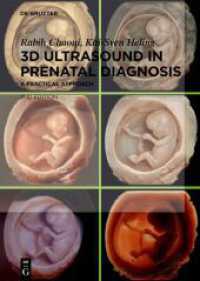- ホーム
- > 洋書
- > 英文書
- > Philosophy
Full Description
Juan Domingo Sanchez Estop argues that Spinoza's influence fundamentally shaped Althusser's philosophical project, providing key concepts and methods that Althusser used to radically rethink Marxism. The book traces five key 'detours and returns' between Althusser and Spinoza, showing how Spinoza's anti-humanism, theory of reading, immanent causality, politics of the conjuncture, and rejection of determinism were mobilised at critical junctures in Althusser's development. In the process, Estop uncovers a new 'Althusserian Spinoza', a thinker of practice and politics whose revolutionary potential remains to be explored.
Bringing together published works, correspondences, and unpublished writings, this groundbreaking study sheds new light on Althusser's theoretical trajectory and reveals the hidden Spinozist foundations of one of the 20th century's most important Marxist thinkers.
Contents
Acknowledgements
Spinoza Citation Style and Abbreviations
Abbreviations for Althusser's Works
Preface
Jason Read
Introduction: Philosophy as Detour
Chapter I: Althusser the anti-humanist, or the break
1. The problem of 'Marx' philosophy
1.1. In search of a philosophy
1.2. Humanism in question
2. On Stalin's side
2.1. Stalin as philosopher
2.2. The philosophical theses of Stalinism
3. The anti-humanist theses
3.1. The context
4. Althusser between determinism and freedom
Chapter II: Althusser the reader
1. The detour through Spinoza
1.1 The Theologico-Political Treatise as key to the sanctuary
1.2. Philosophical 'Marranism': A Discourse of Resistance
2. The Theologico-Political Treatise, a politics of discourse
2.1. The purpose of the Theologico-Political Treatise
2.2. The Spinozian 'époché'
3. Reading Capital with Spinoza
3.1. A particular situation
3.2. The issue of reading
3.3. Reading as a practice of immanence
3.4. On 'symptomatic' reading
3.5. From prophetic revelation to the science of history
Chapter III: Althusser the structuralist?
1. From 'structuralist Marxism' to Spinozist immanentism: a philosophical journey
1.1. From reading to structure
1.2. Structuralism and philosophy: Gilles Deleuze
2. Determinism and breaks
2.1. Althusser and the Marxist whole
2.2. 'Metonymic' or 'structural' causality
2.3. Origin and function of topography
3. Cut and symptom reading
Chapter IV: Althusser the conjuncturist
1. Thinking about the conjuncture
1.1. The conjuncture and its characters
1.2. Towards a philosophical concept of the conjuncture
2. A detour via Machiavelli
2.1. The context of the detour
2.2. Machiavellus Spinozanus
3. Spinoza Machiavellianus
3.1. Machiavelli and us: the 1972 course
4. Interpellation and constitution of the subject
4.1. The ''verità effettuale''
4.2. Spinoza and ideology in reverse
5. Is it easy to be a Spinozist in philosophy?
Chapter V: Althusser and the aleatory
1. Between necessity and the aleatory
2. The Crisis of Marxism
2.1. The 'fusion'
2.2. From failure to the aleatory
3. The 'manifestos' of aleatory materialism
3.1. The oblivion of materialism
3.2. The audacity of Epicurus
3.3. Spinoza in 'The Underground Current'
4. What does aleatory materialism oppose?
4.1. Materialism and its others
4.2. The necessary and the aleatory in Spinoza
4.3. The eternal and the aleatory
4.4. Beyond the principle of reason
5. Spinoza in 'The only materialist tradition'
5.1. Spinoza's nominalism
5.2. A Machiavellian 'Spinozist'
6. A situation without politics
Conclusions: Reason Beyond the Principle of Reason
References
Index








